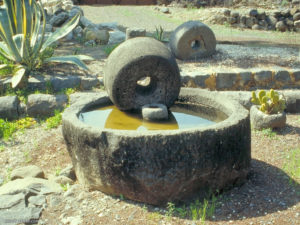18 Then the LORD became jealous for his land, and had pity on his people. 19 The LORD answered and said to his people, “Behold, I am sending to you grain, wine, and oil, and you will be satisfied; and I will no more make you a reproach among the nations. Joel 2:18-19
Prophecy is often written as if it all ready happened, past tense, in English. The became jealous is in the piel tense in the Hebrew, which is a causative tense. The Lord will cause Himself to become jealous.
20 “I will remove the northerner far from you, and drive him into a parched and desolate land, his front into the eastern sea, and his rear into the western sea; the stench and foul smell of him will rise, for he has done great things. Joel 2:20
The cardinal direction of the ancients was east and not north as we perceive it. Therefore the front is in the east and the rear in the west. In ancient Judea enemies came from Egypt in the south or everyone else from the north. Even though the invading locust armies are named in Daniel here we can tell that Egypt is not going to be among them, as no one comes from the south. No one brought an army across the desert of what is now Jordan. The invading locust armies will be driven into the Mediterranean Sea then there is a question as to wither the eastern sea refers to the Dead Sea or the Persian Gulf.
The foul stench of the decaying carcasses has no known parallel in Scripture. So it is left to conjecture as to what this means.
21 “Fear not, O land; be glad and rejoice, for the LORD has done great things! 22 Fear not, you beasts of the field, for the pastures of the wilderness are green; the tree bears its fruit, the fig tree and vine give their full yield. Joel 2:21
The destruction cause by the locust is not permeant, once they are gone the fertility of the land will return.
23 “Be glad, O sons of Zion, and rejoice in the LORD, your God; for he has given the early rain for your vindication, he has poured down for you abundant rain, the early and the latter rain, as before. Joel 2:23
Ancient Judea was a land where the rain must come for there to be crops. There was not great river like the Nile or the Tigris from which to draw irrigation water. The early and latter rains come in the Fall and the Spring respectively.
24 “The threshing floors shall be full of grain, the vats shall overflow with wine and oil. 25 I will restore to you the years which the swarming locust has eaten, the hopper, the destroyer, and the cutter, my great army, which I sent among you. Joel 2:24
Ancient Judea grew what we call winter wheat, which is planted in the fall and harvested in the spring. The damage that the locusts have caused will be restored. The threshing floors will be full. Something the modern western person knows little about because we use combines to harvest and thresh. Threshing floors were flat places usually on top of hills where the wind was constant but not overly strong. The grain is thrown into the air so that the chaff may blow away on the wind.
Grapes were trodden out by feet in winepresses which were hewed out of rocks. There was an upper vat and a shallow lower vat where the juice collected. The lower vat is what is meant by the text.
 Olives are pressed in the same process as the ancients did, the only real difference is that they used a large stone and modern operations still use large stones only in steel vats.
Olives are pressed in the same process as the ancients did, the only real difference is that they used a large stone and modern operations still use large stones only in steel vats.
26 “You shall eat in plenty and be satisfied, and praise the name of the LORD your God, who has dealt wondrously with you. And my people shall never again be put to shame. 27 You shall know that I am in the midst of Israel, and that I, the LORD, am your God and there is none else. And my people shall never again be put to shame. Joel 2:26
When the locusts are gone the fertility of the land will return, and they will eat of it. The question is, when? Israel is a nation at this time. But Zech 14 indicates that they may go back into exile.
